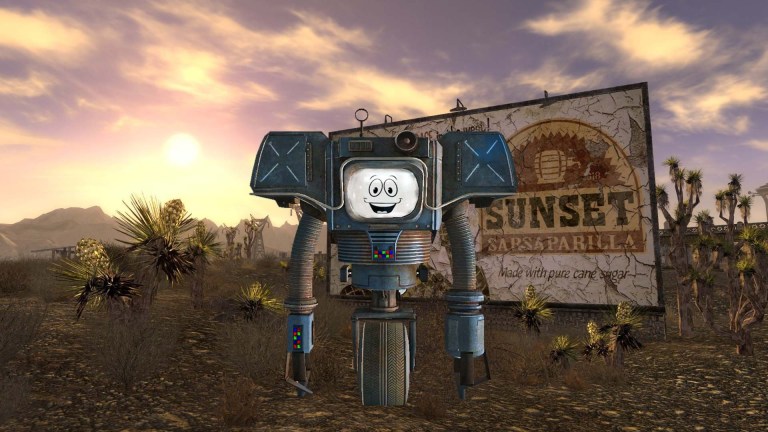Why Fallout Has the Best Licensed Video Game Soundtrack Ever
Fallout wouldn't be the same without those wonderful songs that set the world on fire.

There are a lot of iconic video game soundtracks, but none are quite as magical as Fallout’s. There’s a strange alchemy to the way the franchise pairs its ultra-violent combat and desolate, post-apocalyptic setting with wistful mid-century ditties. The music isn’t a mere accompaniment to the gameplay; it’s the beating heart of the series and has made the games so enduring and beloved they’ve spawned an Amazon Prime TV show. In other words, without its licensed soundtrack, Fallout wouldn’t be the phenomenon it’s become.
The franchise’s musical identity has taken over 27 years to develop and evolve, but the ‘50s post-war sentiment of blissful optimism quivering under the looming threat of nuclear war that is felt throughout the series was established in the first game (or even earlier if you consider the influence of its spiritual predecessor, Wasteland).
Most of the music in Interplay’s Fallout and Fallout 2 is a haunting, ambient soundscape composed by Mark Morgan that reflects the bleakness of the Wasteland but the titles did feature one licensed song each: “Maybe” by the Ink Spots and “A Kiss to Build a Dream On” by Louis Armstrong. Love songs in a loveless world is a concept the franchise would eventually expand upon in a big way.
When Bethesda and game director Todd Howard took over the series with Fallout 3, the game’s score took on a more wartime-inspired, psychologically charged complexion under composer Inon Zur, who would go on to score the series from this point forward. In an interview with Laced Records, Zur explains that the function of the games’ music is to “… hone in on the atmosphere and the emotions that the player might have at a given moment.”
But the biggest overhaul to the franchise’s sonic identity came in the form of Fallout 3’s licensed soundtrack, which was expanded to include 20 songs from the ‘30s, ‘40s, and ‘50s played via in-game radio stations. From the moment Bethesda dropped the now-legendary Fallout 3 teaser trailer featuring The Ink Spots’ “I Don’t Want to Set the World On Fire” back in 2007, the song captured the imaginations of millions of gamers and became the de facto main theme of the franchise.
Subsequently, Fallout: New Vegas, developed by Obsidian Entertainment, added new songs to the catalog that expanded to encompass the crooner and country-Western sounds of the ‘50s that better fit the game’s setting. “The music of the late ’50s, which is when Vegas started to really become a place that anyone cared about—that era was a little bit different in terms of the Rat Pack vibe,” New Vegas lead designer told Engadget back in 2010. “It’s still ’50s but it’s late ’50s.”
For Fallout 4, Howard and audio director Mark Lampert opted for a more optimistic tone, choosing the Ink Spots’ “It’s All Over But the Crying” for the game’s reveal trailer. “It’s very sad,” Howard said of the song in a 2015 interview with Bethesda.net. “…but then it’s also unique amongst The Ink Spots’ songs because the second half is very lively. It’s almost like, ‘Well, it’s all over, let’s go!’ It actually has a fun end to it. It’s almost danceable.”
Flowers need to be given to the devs at Bethesda for curating such wonderful songs. There are tons more songs from the ‘40s and ‘50s that fit the style of the game, but they were clearly deliberate about choosing ones that would stand the test of time and make the game more engaging no matter what the player may be up to. Even the simple act of walking toward a waypoint can be super fun when you’ve got this blaring out of your Pip-Boy:
The trees are the sappiest
The days are the nappiest
The dogs are the yappiest
The kids are the scrappiest
The jokes the snappiest
The folks the happiest
Way baaack home
The brilliance of the soundtrack is that each song tinges the game in a special way. For example, Skeeter Davis’ “The End of the World” is a heart-wrenching ballad about the anguish of being dumped, but when it’s overlayed onto the world of Fallout, not only does the song infuse the game’s grim world with much-needed sentimentality and warmth, but the lyrics take on a new, darker meaning in the post-apocalyptic context.
There are upbeat jingles like Cole Porter’s “Anything Goes” and The Five Stars’ “Atom Bomb Baby” that provide a playful contrast to the Wasteland’s bleakness. Ravishing love songs like Billie Holiday’s “Crazy He Calls Me” and Nat King Cole’s “Love Me As Though There Were No Tomorrow” bring a warm sense of sentimentality to the table. And then there are fun tongue-in-cheek cuts like Ray Smith’s “Right Behind You Baby” and Roy Brown’s “Butcher Pete” that hilariously underscore the game’s tense enemy encounters.
Fallout has become so canonized over the years that it’s easy to overlook just how novel its implementation of such music is. There’s something strange and wonderful about mutilating super mutants in V.A.T.S. slo-mo while some of the most saccharine, sentimental songs ever written play over the speakers. There’s nothing quite like Fallout’s synergy between its music and gameplay, which is what makes it so incomparable. There are games with terrific licensed soundtracks such as Tony Hawk’s Pro Skater, Grand Theft Auto: Vice City, and Brutal Legend. But Fallout’s licensed tracks change the fabric of the experience, balance out the game’s dreariness, and help create an unforgettable, retrofuturist aesthetic that still feels novel.
But it goes even deeper than that. Fallout’s soundtrack conjures so much nostalgia and emotion because, as a collection of songs, it harnesses the power of the real-world angst that defined post-war America. In other words, this soundtrack has something to say. The enduring theme of the games is that idyllic ambition and the dream of picture-perfect nuclear families are but flickering remnants of the past amid a wasteland of inevitable devastation and decay. Or, as the games more tersely (and poignantly) put it: “War never changes.”
